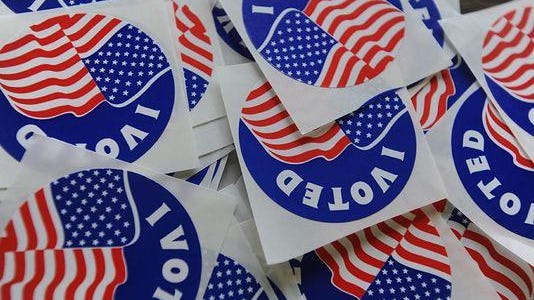Same-day voter registration sparks fight
 Christine Ferretti
Christine FerrettiA proposal to restore straight-party voting and expand options including same-day voter registration has sparked a fight about what practices should be enshrined in Michigan's Constitution.

The "Promote the Vote" initiative would amend the state's Constitution in the name of "voting rights" to allow no-reason absentee voting by mail, reinstate straight-party voting and let residents register to vote up to and on Election Day.
The ballot question is one of three going before voters in the general election.
Supporters argue it would expand voting options and would improve access to the ballot in Michigan, while opponents contend it would open the state to more voter fraud and is overly vague in places, creating redundancy with state law.
The proposed constitutional amendment is backed by a coalition that includes the American Civil Liberties Union of Michigan, League of Women Voters of Michigan, the Detroit chapter of the NAACP, Michigan League for Public Policy and others.
The initiative covers "common sense" reforms and it's designed to improve security and access to the ballot in Michigan," said Todd Cook, campaign director for Promote the Vote.
"In a lot of ways, this is not new ground," he said. "It's more kind of catching up and having a system that works."
Kary Moss, president of the Promote the Vote coalition, added the measure is necessary because the state Legislature has refused to act.
"What these policies do is ensure a basic modernization of Michigan electoral law and enshrines in the constitution certain rights," said Moss, director of nationwide initiatives for the ACLU.
But critics argue some elements of the plan are vague, already covered under state and federal laws and could lead to voter fraud.
"First and foremost, the same-day registration component is a gateway for fraud," said Tony Daunt, executive director of the Michigan Freedom Fund, a nonprofit that advocates for constitutional rights.
Voter registration is submitted the Secretary of State so the office can run a number of checks to verify the identity of the voter.
"This completely does away with the ability to do that," Daunt added. "On Election Day, when someone comes in to register to vote, the logistics are impossible to ensure that there isn't fraud going on. That completely undermines the vote of everyone else."
Under the proposal, Michigan residents would be able to vote by mail or in person up to 15 days before an election, up from 30 days covered under the current law. Voters could also register in-person with proof of residency through Election Day.
Former state Elections Director Chris Thomas is among those encouraging voters to cast a 'yes' vote on the proposal that he says will ensure access to the ballot with "minimum barriers."
Michigan, he said, is one of only 13 states in the nation that does not permit early voting or no-reason absentee voting. There are 37 other states that do as well as the District of Columbia.
Thomas added that 27 states allow no-reason absentee voting but Michigan "has not found a way to get this done."
Secretary of State Ruth Johnson isn't endorsing or opposing the proposal. But in the past, she has noted that parts of the initiative are already covered under existing state and federal laws, said Fred Woodhams, a spokesman for Johnson's office.
Those guarantees under state law are ensuring ballots are secret, conducting post-election audits and transmitting ballots to military and overseas voters. Clerks are required already to send out those ballots 45 days ahead of the election.
Thomas said including it in the proposal "puts it in (the Constitution) as a right."
Johnson "has had concerns" about same-day voter registration, Woodhams said.
"She's open to reducing the amount of time people can register before Election Day," he said. "But she has concerns that there's not enough time to even do a cursory verification of the the voter's information if same-day registration is allowed."
Thomas said Election Day registration would be new for Michigan, but there are already 23 other states that offer it.
This process, he noted, would take place in a clerk's office and the state recently rolled out an enhanced qualified voter file, which would make the process easier.
"We've got 90 percent-plus registered to vote right now. Seems hard to believe that any large volume of people will be showing up to do this on Election Day," he said. "But it (the proposal) is a safety net for those who are not registered."
Michigan currently allows absentee by-mail voting for seniors over the age of 60 and younger voters who provide a valid excuse, such as a disability or plans to be out of town on Election Day. Voters would not need an excuse under the ballot proposal.
In the November 2016 election, one-quarter of the ballots — or 26 percent — were absentee, according to state election officials.
Johnson has supported the no-reason absentee with the caveat that people who get an absentee without citing a reason show identification and pick up the ballot in person, Woodhams said. It's not clear how the proposal would work in that respect, he said.
"She would want to ensure that it's done with integrity and wants people to show ID," he said. "The same as they would when they voted."
The ballot measure also seeks to restore straight-ticket voting which was eliminated by the state Legislature, a move upheld by a panel of the 6th Circuit U.S. Court of Appeals. The practice isn't being allowed in the Nov. 6 election.
Legislators voted to ban straight-ticket voting in late 2015, arguing voters should select individual candidates on each ballot rather than simply voting for a political party's nominees. Straight-ticket voting continued in 2016 amid the legal battle over the state law, but .
Thomas called the straight ticket ban an "unfortunate enactment" by the Legislature. About 58 percent of voters in Wayne County cast a straight-party ballot in 2014.
The Michigan Republican Party has not taken a position on the proposal, but it also has concerns about it, said spokeswoman Sarah Anderson.
Among them, the restoration of straight-ticket voting "an outdated and antiquated process that fewer than eight states in the nation currently have," she said.
The initiative also covers automatic registration which Thomas said complies with the 1993 National Voter Registration Act. In 13 other states and the District of Columbia, automatic registration has already been adopted.
cferretti@detroitnews.com